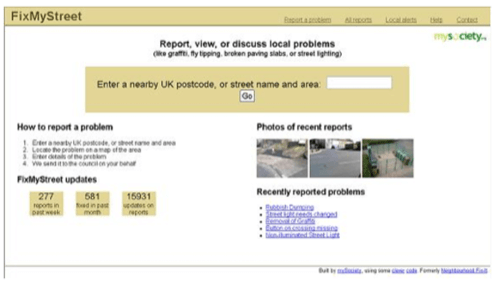Last month US Presidential hopeful John McCain announced an ambitious new proposal that would award a $300 million prize to the inventor of a better battery for powering automobiles. It is a laudable idea and one that could tackle some of the biggest problems the world faces – but it’s a proposal grounded in last-century thinking none the less.

On July 1st the British government launched a smaller but radically different project. Show Us a Better Way is a government sponsored mashup contest, inviting members of the public to submit public data mashup ideas for funding. There are some exciting ideas being offered already. We argue that a project like this could have a greater impact than McCain’s battery contest.
Context
Oil dependency is a big enough problem that it threatens the very continuity of life on earth and leads to unfathomable human rights. If the McCain project leads to a solution to this problem, we will shut up and be thankful. There’s no guarantee it will work, though, it is very limited in its imagination and we believe that strategies like this should be the exception and not the rule.
In the 20th century, during industrialization’s heyday, big public goals made sense. Today, in an era transformed by technology empowering the individual like few things ever have before, questions for which the answers are already known may prove less valuable than open-ended inquiries with substantial institutional support.
The UK government’s Show Us a Better Way project, while tiny in comparison, represents a new era of thought leadership. The government is offering to expose public data to developers without presuming to know what could be done with it. “Here’s what we’ve got, what can you do with it?” is a great question to ask. We would love to see Show Us a Better Way get the kind of financial support that McCain is proposing for the battery project. The resulting application development could radically improve human quality of life in more ways than can be imagined.
McCain, unfortunately, admits that he doesn’t know how to use a computer. Perhaps someone can explain APIs and mashups to him in the event that he wins the Presidency.
Early Examples
The UK government provides a number of unaffiliated early examples of reused public data including the following:
Location Data
From UpMyStreet location profiles to Fix My Street streamlined repair requesting to the fantastic prison quality review site Rate My Prison – the possibilities here are huge. Imagine integration of 3rd party services like Yahoo’s Location Metadata Database and FireEagle location tracking, mashed up with government data.

Public Discourse
SpinDifferent compares public policy statements on the same topics from the UK, US and UN. Comment on This repurposes governement documents to facilitate public comment.
You can see a full list of ideas submitted so far here.
We’d like to imagine mobile mashups serving up data for the benefit of children, the elderly and the environment. DVR mashups offering genuine cultural enrichment. GPS mashups for public health. The possibilities are endless.
No single organization, perhaps especially government, can rival the imagination and innovation that the public at large can offer – if only the public received the resources that government has at its disposal. Some of these ideas may come in the form of new functionality and knowledge creation, some of them may come in the form of new interfaces. Check out the US nonprofit project OpenCongress.org for one example of a beautiful, cutting edge interface that government itself is unlikely to have ever created for public data (our review).
We hope that a solution to the particular problem of internal combustion automobiles can be found, but we also hope that governments around the world will take inspiration from this UK initiative and dedicate substantial resources to supporting free public use of the data that government has amassed. If data is the new currency, then then public APIs and mashups could be the economic development paradigm of this century.










